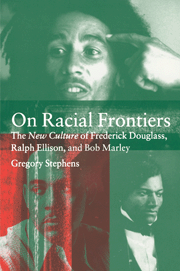The Influence of Bob Marley’s Absent, White FatherPosted in Articles, Biography, Caribbean/Latin America, Literary/Artistic Criticism, Media Archive on 2010-10-22 03:34Z by Steven |
The Influence of Bob Marley’s Absent, White Father
The Dread Library
Essays from the University of Vermont Class, Rhetoric of Reggae Music
2002-04-30
Scott Gurtman
My fadda was a guy yunno, from England here, yunno? Him was like…like you can read it yunno, it’s one o’dem slave stories: white guy get the black woman and breed her. He’s a English guy…I t’ink. Cos me see him one time yunno. My mother? My Mother African.” (Bob Marley, 1978)
The psychological aftermath of being an abandoned child of a biracial marriage was something that heavily influenced reggae superstar Bob Marley for his entire career. Many of Marley’s most loyal fans and the vast majority of reggae enthusiasts are unaware that he was, indeed, born to a white father, Captain Norval Marley, and a black mother, Cedella Booker. Bob Marley grew up angry with his father who he felt had mistreated him and his mother. Marley was also partially ashamed of his white heritage. This childhood mentality of resentment and embarrassment sculpted Marley’s youth and eventually influenced the ideals and work of his musical genius for his entire career. The sentiment of abandonment and the lack of a father figure forced Bob Marley to look to other means, like the ideals of Rastafarianism, for direction, comfort, and a sense of belonging. The strong allegiance to black culture that resulted from the absence of his white father also partially attributed to Marley’s unwaveringly sense of Pan-Africanism. The imperfections and almost total absence of Bob Marley’s Caucasian father, Captain Norval Marley, had a profound psychological influence on the great reggae icon…
Read the entire article here.
